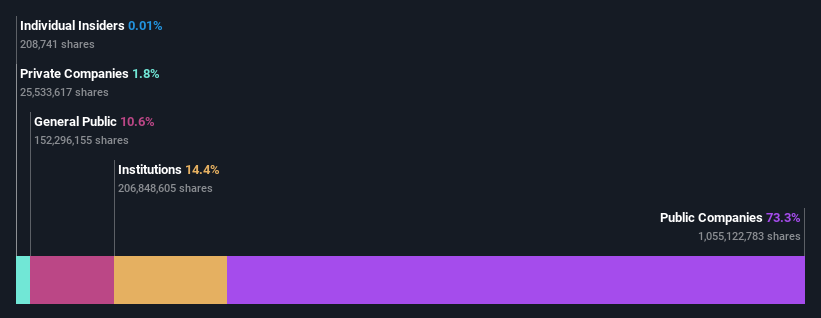Institutions own 14% of ICICI Prudential Life Insurance Company Limited (NSE:ICICIPRULI) shares but public companies control 73% of the company

Key Insights
- Significant control over ICICI Prudential Life Insurance by public companies implies that the general public has more power to influence management and governance-related decisions
- The largest shareholder of the company is ICICI Bank Limited with a 51% stake
- Institutional ownership in ICICI Prudential Life Insurance is 14%
A look at the shareholders of ICICI Prudential Life Insurance Company Limited (NSE:ICICIPRULI) can tell us which group is most powerful. And the group that holds the biggest piece of the pie are public companies with 73% ownership. That is, the group stands to benefit the most if the stock rises (or lose the most if there is a downturn).
Meanwhile, institutions make up 14% of the company’s shareholders. Large companies usually have institutions as shareholders, and we usually see insiders owning shares in smaller companies.
Let's take a closer look to see what the different types of shareholders can tell us about ICICI Prudential Life Insurance.
See our latest analysis for ICICI Prudential Life Insurance

What Does The Institutional Ownership Tell Us About ICICI Prudential Life Insurance?
Many institutions measure their performance against an index that approximates the local market. So they usually pay more attention to companies that are included in major indices.
ICICI Prudential Life Insurance already has institutions on the share registry. Indeed, they own a respectable stake in the company. This suggests some credibility amongst professional investors. But we can't rely on that fact alone since institutions make bad investments sometimes, just like everyone does. When multiple institutions own a stock, there's always a risk that they are in a 'crowded trade'. When such a trade goes wrong, multiple parties may compete to sell stock fast. This risk is higher in a company without a history of growth. You can see ICICI Prudential Life Insurance's historic earnings and revenue below, but keep in mind there's always more to the story.

Hedge funds don't have many shares in ICICI Prudential Life Insurance. ICICI Bank Limited is currently the company's largest shareholder with 51% of shares outstanding. This implies that they have majority interest control of the future of the company. For context, the second largest shareholder holds about 22% of the shares outstanding, followed by an ownership of 2.0% by the third-largest shareholder.
While studying institutional ownership for a company can add value to your research, it is also a good practice to research analyst recommendations to get a deeper understand of a stock's expected performance. There are plenty of analysts covering the stock, so it might be worth seeing what they are forecasting, too.
Insider Ownership Of ICICI Prudential Life Insurance
The definition of an insider can differ slightly between different countries, but members of the board of directors always count. Management ultimately answers to the board. However, it is not uncommon for managers to be executive board members, especially if they are a founder or the CEO.
I generally consider insider ownership to be a good thing. However, on some occasions it makes it more difficult for other shareholders to hold the board accountable for decisions.
Our information suggests that ICICI Prudential Life Insurance Company Limited insiders own under 1% of the company. However, it's possible that insiders might have an indirect interest through a more complex structure. As it is a large company, we'd only expect insiders to own a small percentage of it. But it's worth noting that they own ₹116m worth of shares. It is good to see board members owning shares, but it might be worth checking if those insiders have been buying.
General Public Ownership
With a 11% ownership, the general public, mostly comprising of individual investors, have some degree of sway over ICICI Prudential Life Insurance. This size of ownership, while considerable, may not be enough to change company policy if the decision is not in sync with other large shareholders.
Public Company Ownership
Public companies currently own 73% of ICICI Prudential Life Insurance stock. This may be a strategic interest and the two companies may have related business interests. It could be that they have de-merged. This holding is probably worth investigating further.
Next Steps:
It's always worth thinking about the different groups who own shares in a company. But to understand ICICI Prudential Life Insurance better, we need to consider many other factors. For example, we've discovered 2 warning signs for ICICI Prudential Life Insurance (1 makes us a bit uncomfortable!) that you should be aware of before investing here.
If you would prefer discover what analysts are predicting in terms of future growth, do not miss this free report on analyst forecasts.
NB: Figures in this article are calculated using data from the last twelve months, which refer to the 12-month period ending on the last date of the month the financial statement is dated. This may not be consistent with full year annual report figures.
If you're looking to trade ICICI Prudential Life Insurance, open an account with the lowest-cost platform trusted by professionals, Interactive Brokers.
With clients in over 200 countries and territories, and access to 160 markets, IBKR lets you trade stocks, options, futures, forex, bonds and funds from a single integrated account.
Enjoy no hidden fees, no account minimums, and FX conversion rates as low as 0.03%, far better than what most brokers offer.
Sponsored ContentNew: AI Stock Screener & Alerts
Our new AI Stock Screener scans the market every day to uncover opportunities.
• Dividend Powerhouses (3%+ Yield)
• Undervalued Small Caps with Insider Buying
• High growth Tech and AI Companies
Or build your own from over 50 metrics.
Have feedback on this article? Concerned about the content? Get in touch with us directly. Alternatively, email editorial-team (at) simplywallst.com.
This article by Simply Wall St is general in nature. We provide commentary based on historical data and analyst forecasts only using an unbiased methodology and our articles are not intended to be financial advice. It does not constitute a recommendation to buy or sell any stock, and does not take account of your objectives, or your financial situation. We aim to bring you long-term focused analysis driven by fundamental data. Note that our analysis may not factor in the latest price-sensitive company announcements or qualitative material. Simply Wall St has no position in any stocks mentioned.
About NSEI:ICICIPRULI
ICICI Prudential Life Insurance
Provides life insurance, pension, and health insurance products to individuals and groups in India.
Proven track record with mediocre balance sheet.
Similar Companies
Market Insights
Community Narratives



